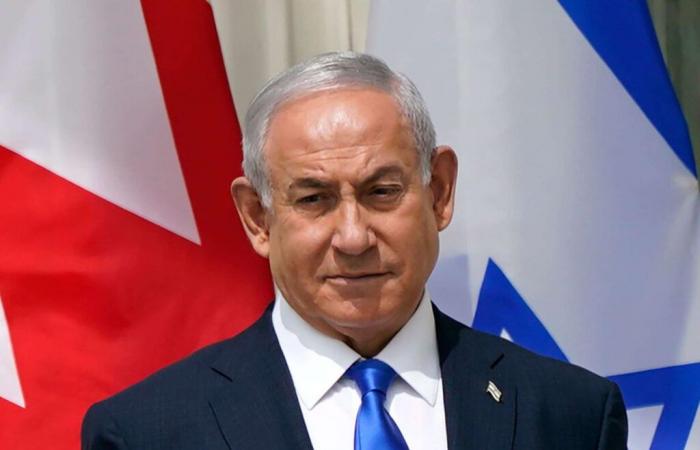
The arrest warrant issued by the International Criminal Court (ICC) against him is the result of an “anti-Semitic” and “anti-Israeli” decision according to Benyamin Netanyahu. Several countries have rejected the ICC decision, but what is France's position?
“No outrageous anti-Israeli decision will prevent us – and especially not me – from continuing to defend our country in any way.” This is the response of Israeli Prime Minister Benjamin Netanyahu to the decision of the International Criminal Court (ICC) to issue arrest warrants against him taken on Thursday, November 21. A few hours later, the leader even denounced an “anti-Semitic” decision. A position shared by the Israeli ambassador to France, Joshua Zarka, who criticizes an “entirely arbitrary” choice aimed at “preventing” Israel from defending itself at the microphone of Franceinfo.
The ICC explained its decision to issue international arrest warrants against the Israeli Prime Minister, his former Defense Minister Yoav Gallant and the leader of Hamas, Mohammed Deïf in a long press release. She says she has “reasonable grounds to believe” that Mr. Netanyahu and Mr. Gallant “bear criminal responsibility for the war crime of using starvation as a method of war.” The court also suspects the Israeli Prime Minister and his former minister of “crimes against humanity”, specifying that there are reasons to believe that they are responsible for: “murders, persecution and other inhumane acts”, and for “attacks intentionally directed against the civilian population”.
This decision obliges the 124 countries having signed the Treaty of Rome which formalizes the status of the ICC, including France, to arrest the Israeli Prime Minister if he goes to their territory, as well as the two other people targeted. Note that Mohammed Deïf was announced dead by Israel. The positions of the Elysée, the Quai d'Orsay and the French government are very clear: Paris “supports the International Criminal Court, its independence and the fight against impunity in all situations”. However, the Israeli ambassador to France invites Emmanuel Macron to “follow the example that has been given by the United States, by the American president and by other countries of the European Union such as Hungary, as Austria and the Czech Republic, who deplored this resolution. The United States has indeed rejected the “scandalous” decision of the ICC, but it must be kept in mind that the United States has not signed the Treaty of Rome.
Latest updates
18:49 – Reactions from Italy and Germany
Italy has indicated that it would be “obligated to arrest” Benjamin Netanyahu. The German government, for its part, says it is “examining” what this decision “means for application in Germany”.
16:10 – Netanyahu praises Hungary's “moral clarity” and denounces the “shameful weakness” of countries supporting the ICC
Israeli Prime Minister Benjamin Netanyahu today thanked Hungary for its invitation to its soil despite the ICC arrest warrant against him. He salutes the “moral clarity” of his Hungarian counterpart. “Faced with the shameful weakness of those who supported the scandalous decision [qui remet en question] the right of the State of Israel to defend itself, Hungary – like our friends, the United States – demonstrates moral clarity and places itself on the side of justice and truth,” declared Benjamin Netanyahu, quoted in a press release from its services and by The World.
15:14 – The Quai d'Orsay “takes note” of the ICC arrest warrants
France “takes note” of the ICC arrest warrants, the spokesperson for the Ministry of Foreign Affairs announced today. “Faithful to its long-standing commitment to supporting international justice”, Paris “recalls its attachment to the independent work of the Court”, it is written, cited by Le Figaro. However, it is not indicated whether France would arrest Benjamin Netanyahu and Yoav Gallant if they went to its territory.
14:34 – The difficult application of the arrest warrant
In fact, the ICC does not itself have the forces necessary to execute its arrest warrants. The Court relies on the 124 countries that have ratified the Rome Statute to arrest and transfer indicted persons. Except that nothing obliges these countries to follow the treaty. If in theory, Benjamin Netanyahu and Yoav Gallant can no longer go to the signatory states of the treaty, the two politicians in reality have greater freedom of movement. For example, last September, Vladimir Putin was received in Mongolia even though an arrest warrant had been issued against him.
And in the case of the Israelis, Viktor Orban, Hungarian Prime Minister, has already invited Benjamin Netanyahu to Hungary to “challenge the International Criminal Court”, reports RFI.
11:45 – France cautious about the application of the arrest warrant against Netanyahu
In France, the Elysée and the government have indicated “support” of the ICC, but have been more cautious about the French position on the application of the arrest warrants against Benyamin Netanyahu. The Ministry of Foreign Affairs estimated via its spokesperson Christophe Lemoine during a press briefing Thursday evening that the arrest of the Israeli Prime Minister was “a legally complex point”.
At the same time, other European countries have indicated that they will follow the ICC decision by arresting Benjamin Netanyahu if he visits their territory, such as Spain, Ireland and the Netherlands. Others, on the other hand, opposed the ICC's decisions, like Austria.
10:01 – Israel asks France not to follow the ICC decision
While France is theoretically required to apply the decisions of the ICC, Israel invites it to oppose the court decision. It was the Israeli ambassador to France, Joshua Zarla, who made the request on Franceinfo, asking Emmanuel Macron to instead “follow the example that was given by the United States, by the American president and by other European Union countries such as Hungary, Austria and the Czech Republic, which deplored this resolution. According to him, the ICC's decision is “entirely arbitrary”, “anti-Israeli” and aims to “prevent” Israel from defending itself.
21/11/24 – 22:28 – EU wants arrest warrant enforced
Josep Borrell, the head of European diplomacy, expressed his wish that the international arrest warrant against Netanyahu would be implemented. “It's not a political decision. It's a decision of a court, of a court of justice, of an international court of justice.”
11/21/24 – 7:54 p.m. – Washington refutes the Court's decision
“The United States categorically rejects the decision of the (International Criminal) Court to issue arrest warrants against senior Israeli officials,” responded a spokesperson for the White House National Security Council. “We remain deeply concerned by the prosecutor's eagerness to seek arrest warrants and by the troubling errors in the process that led to this decision.” Washington recalls that it considers that the ICC has “no legal jurisdiction in this matter”.





